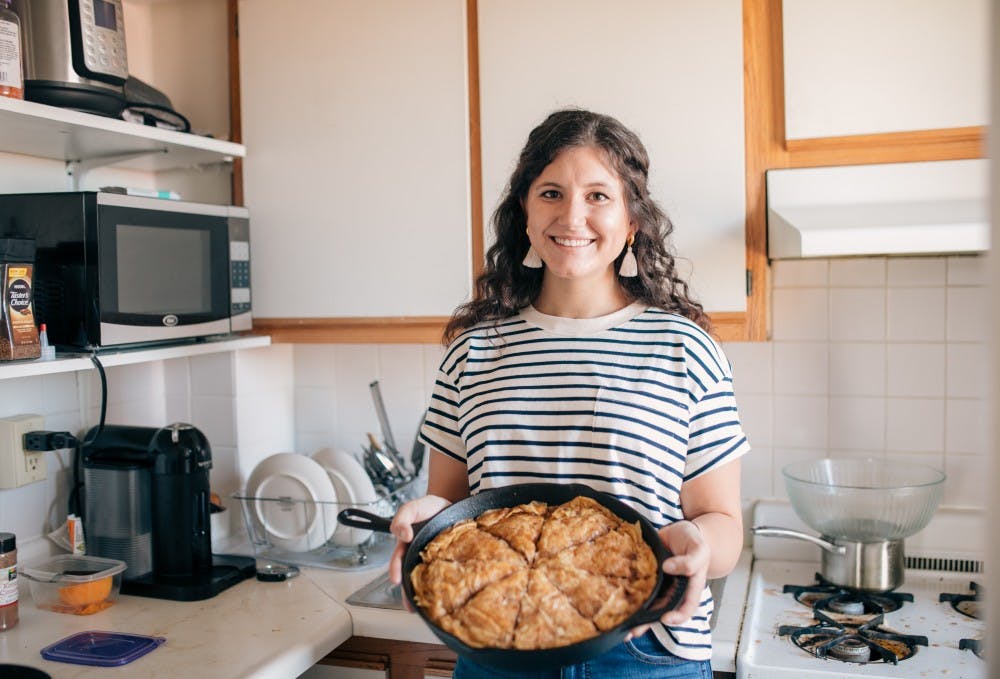Walking up and down Locust since Spring Break, you may notice that small, rose–colored boxes seem to be slowly, but steadily, taking over campus. You may notice Rachel Prokupek—graduate of Le Cordon Bleu Paris studying cuisine and pastry, Executive Director of Penn Appetit Cookbook, and innovator behind the group's Whisk cookbook—running a baklava business out of Huntsman GSRs and her apartment. Maybe you've come across some of her wildly successful and fan–photo based Instagram accounts and campaigns, which showcase the visual beauty of Rachel's craftsmanship.
After trying a slice of this crispy, gooey, and nutty baklava, available in rose, orange blossom, and salted caramel flavors, we can attest that not only is this baklava a feast for the eyes, but for the tastebuds and soul as well.
Where did she learn all her skills? Beirut, of course. And how did she end up there? Rachel had a job in Philly during her sophomore summer, but as she sat at her computer at night, she came across Facebook posts of her friend Rita from culinary school working at a restaurant in Beirut. Her boyfriend, Adam, was studying in Beirut and Rachel managed to set the two of them up so he could try out the restaurant. After Rachel’s two worlds collided, she ended up making the tough decision to quit her job and move to Beirut on a whim to work at the same restaurant as Rita, an opportunity she knew she would never get again.
Rachel went down the rabbit hole that would become her obsession with baklava one day in the kitchen that summer.
Baklava is traditionally a sweet pastry made of phyllo dough and filled with various nuts. It’s usually held together by honey and formed in the shape of a diamond. But this one in Beirut was completely different—it was in a pie form, served at the restaurant with a scoop of ice cream, and held together by loads of syrup instead of honey. Eventually, after witnessing her fascination with the dessert, Tommy (the Greek owner of the restaurant), taught Rachel how to make this new baklava pie. From there, she was hooked. “I don’t know why I have such a fascination [with] this dessert, but was the most beautiful dessert I’ve ever seen. It was delicious!" Rachel said enthusiastically. "It was just so cool because it was very trendy, but had the same flavors that baklava would normally have.” By the end of the summer, Rachel was making this beautiful dessert every morning, continuously posting images of her final creation all over Instagram, unintentionally marketing it to her future customers at Penn.
Rachel's passion for baklava continued when she returned to campus. After adjusting to the challenges of cooking in a small apartment, she kept making this new baklava, giving it to friends and posting it all over social media. However, the turning point wasn’t until winter break when she made her new “go–to” dessert for her mom and her friends and saw their excited response. Already making baklava constantly at school, studying branding, packaging, and logo design at Wharton, and wanting to experiment in a low–risk environment like a college campus, Rachel started brainstorming.
Using her Wharton background, Rachel started small and worked with focus groups to answer her questions about demand, pricing, packaging, and distribution. She focused on the logo and packaging, and started by reaching out to the old creative director of Penn Appetit to learn more about graphic design and testing her own styles. “I played [with] the font for two days straight; I just clicked between different fonts. It was ridiculous,” she says.
Ultimately, she ended up with this BKLV logo. After bringing her various logos to the focus group, she found the responses of the people around her to be overwhelming, with many pointing out its similarity to Philly's LOVE statue. At that moment, it clicked. While yes, the logo resembles the love statue, the meaning for her stemmed far deeper. It represented her story, her background, and her community. The logo is a larger play on a few other elements. First, in the Arabic language, there are no vowels and only accents. Rachel's logo BKLV removes all of the vowels. Additionally, the V is positioned as a slice of pie. This non–traditional way of serving this dessert indeed needed a non–traditional logo. The beautiful rose color of the box reflects the fact that rose is an important color and flavor in Middle Eastern countries, and Rachel’s baklava is rose–flavored with dried roses on top.
When asked about the biggest challenge of running this business, Rachel answers with the number of orders, capacity, space, and distribution. “I know these are good problems to have, but I just had so many orders the first week.” Also, balancing a full school workload with a small business is a challenge. Rachel is less inspired by the financial reward of the business, but rather driven by passion and genuine desire to share her skill and flavors with the wider Penn campus.

“Success isn’t about making money, that’s not why I decided to do this. It’s more about sharing my passion for making baklava, and I think success to me would be having people I’ve never met before order this," Rachel reiterated. "I want the word to spread that I make good baklava … and it’s starting to happen, which is really exciting.” And the minute you bite into the crispy phyllo dough, the sugary and buttery sauce, and the crunchy nuts, you'll certainly taste Rachel's passion and love.
Now eight weeks into orders, Rachel sells large slices for $6, a half pie at $20, and a full pie at $35. Make your orders at the Baklava by Rachel official website, which is also listed in her Instagram bio.







